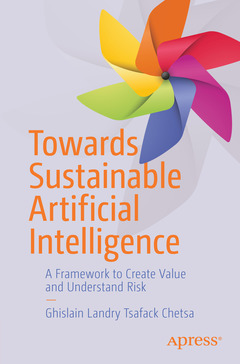Towards Sustainable Artificial Intelligence, 1st ed. A Framework to Create Value and Understand Risk
Auteur : Tsafack Chetsa Ghislain Landry

So far, little effort has been devoted to developing practical approaches on how to develop and deploy AI systems that meet certain standards and principles. This is despite the importance of principles such as privacy, fairness, and social equality taking centre stage in discussions around AI. However, for an organization, failing to meet those standards can give rise to significant lost opportunities. It may further lead to an organization?s demise, as the example of Cambridge Analytica demonstrates. It is, however, possible to pursue a practical approach for the design, development, and deployment of sustainable AI systems that incorporates both business and human values and principles.
This book discusses the concept of sustainability in the context of artificial intelligence. In order to help businesses achieve this objective, the author introduces the sustainable artificial intelligence framework (SAIF), designed as a reference guide in the development and deployment of AI systems.The SAIF developed in the book is designed to help decision makers such as policy makers, boards, C-suites, managers, and data scientists create AI systems that meet ethical principles. By focusing on four pillars related to the socio-economic and political impact of AI, the SAIF creates an environment through which an organization learns to understand its risk and exposure to any undesired consequences of AI, and the impact of AI on its ability to create value in the short, medium, and long term.
What You Will Learn
- See the relevance of ethics to the practice of data science and AI
- Examine the elements that enable AI within an organization
- Discover the challenges of developing AI systems that meet certain human or specific standards
- Explore the challenges of AI governance
- Absorb the key factors to consider when evaluating AI systems
Who This Book Is For
Decision makers such as government officials, members of the C-suite and other business managers, and data scientists as well as any technology expert aspiring to a data-related leadership role.Identify ethical hazards throughout the development and deployment of AI systems
Understand how to audit an organization’s AI systems
Explore how you can assess the impact of AI on an organization’s ability to create value in the short, medium, and long term
Date de parution : 07-2021
Ouvrage de 140 p.
15.5x23.5 cm
Disponible chez l'éditeur (délai d'approvisionnement : 15 jours).
Prix indicatif 47,46 €
Ajouter au panier


